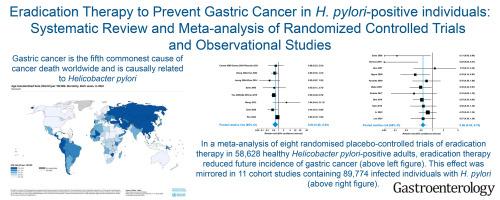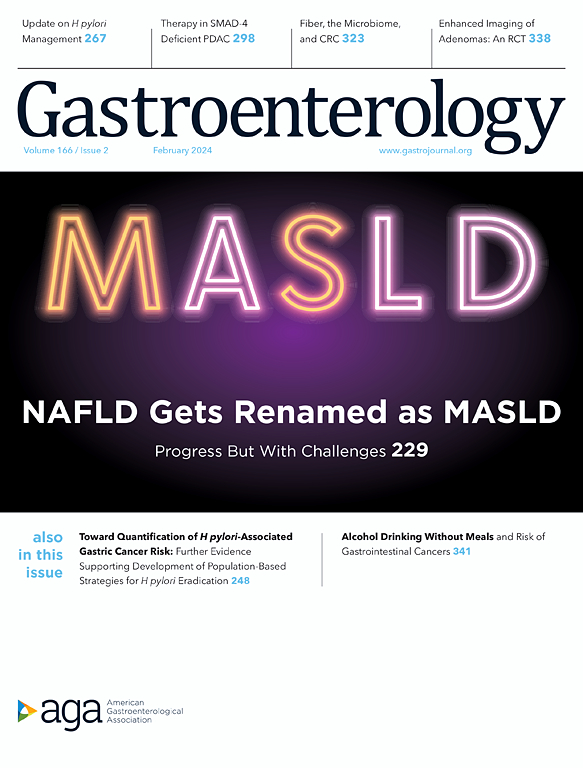Eradication Therapy to Prevent Gastric Cancer in H. pylori-positive individuals: Systematic Review and Meta-analysis of Randomized Controlled Trials and Observational Studies.
IF 25.7
1区 医学
Q1 GASTROENTEROLOGY & HEPATOLOGY
引用次数: 0
Abstract
Background & aims
Screening for, and treating, Helicobacter pylori (H. pylori) in the general population or patients with early gastric neoplasia could reduce incidence of, and mortality from, gastric cancer. We updated a meta-analysis of randomized controlled trials (RCTs) examining this issue.Methods
We searched the literature through 4th October 2024, identifying studies examining effect of eradication therapy on incidence of gastric cancer in H. pylori-positive adults without gastric neoplasia at baseline or H. pylori-positive patients with gastric neoplasia undergoing endoscopic mucosal resection (EMR) in either RCTs or observational studies. The control arm received placebo or no eradication therapy in RCTs and no eradication therapy in observational studies. Follow-up was ≥2 years. We estimated relative risks (RR) of gastric cancer incidence and mortality.Results
Eleven RCTs and 13 observational studies were eligible. For RCTs, RR of gastric cancer was lower with eradication therapy in healthy H. pylori-positive individuals (eight RCTs: 0.64; 95% CI 0.48-0.84) and H. pylori-positive patients with gastric neoplasia undergoing EMR (three RCTs: 0.52; 95% CI 0.38-0.71). RR of death from gastric cancer was lower with eradication therapy in healthy H. pylori-positive individuals (five RCTs: 0.78; 95% CI 0.62-0.98). In observational studies, RR of future gastric cancer was lower with eradication therapy in H. pylori-positive subjects without gastric neoplasia at baseline (11 studies: 0.56; 95% CI 0.43-0.73) and H. pylori-positive patients with gastric neoplasia undergoing EMR (two studies: 0.19; 95% CI 0.06-0.61).Conclusions
This meta-analysis provides further evidence that administering eradication therapy prevents gastric cancer in H. pylori-positive individuals, with consistency in results among studies of different design.

根除治疗预防幽门螺杆菌阳性个体胃癌:随机对照试验和观察性研究的系统评价和荟萃分析。
背景,目的在普通人群或早期胃肿瘤患者中筛查和治疗幽门螺杆菌(H. pylori)可以降低胃癌的发病率和死亡率。我们更新了一项随机对照试验(rct)的荟萃分析,研究了这一问题。方法:我们检索了截至2024年10月4日的文献,通过随机对照试验或观察性研究,确定了根除治疗对基线时未发生胃瘤的幽门螺杆菌阳性成人或内镜下粘膜切除术(EMR)的幽门螺杆菌阳性胃瘤患者胃癌发病率的影响。对照组在随机对照试验中接受安慰剂或无根除治疗,在观察性研究中接受无根除治疗。随访≥2年。我们估计胃癌发病率和死亡率的相对危险度(RR)。结果6项随机对照试验和13项观察性研究符合条件。在随机对照试验中,健康的幽门螺杆菌阳性个体接受根除治疗后胃癌的RR较低(8项随机对照试验:0.64;95% CI 0.48-0.84)和幽门螺旋杆菌阳性胃肿瘤患者行EMR(3个随机对照试验:0.52;95% ci 0.38-0.71)。在健康的幽门螺杆菌阳性个体中,接受根除治疗后胃癌死亡的RR较低(5个rct: 0.78;95% ci 0.62-0.98)。在观察性研究中,在基线时无胃瘤的幽门螺杆菌阳性受试者中,根治治疗后未来胃癌的RR较低(11项研究:0.56;95% CI 0.43-0.73)和幽门螺旋杆菌阳性胃肿瘤患者行EMR(两项研究:0.19;95% ci 0.06-0.61)。结论:本荟萃分析提供了进一步的证据,证明给予根除治疗可以预防幽门螺杆菌阳性个体的胃癌,不同设计的研究结果一致。
本文章由计算机程序翻译,如有差异,请以英文原文为准。
求助全文
约1分钟内获得全文
求助全文
来源期刊

Gastroenterology
医学-胃肠肝病学
CiteScore
45.60
自引率
2.40%
发文量
4366
审稿时长
26 days
期刊介绍:
Gastroenterology is the most prominent journal in the field of gastrointestinal disease. It is the flagship journal of the American Gastroenterological Association and delivers authoritative coverage of clinical, translational, and basic studies of all aspects of the digestive system, including the liver and pancreas, as well as nutrition.
Some regular features of Gastroenterology include original research studies by leading authorities, comprehensive reviews and perspectives on important topics in adult and pediatric gastroenterology and hepatology. The journal also includes features such as editorials, correspondence, and commentaries, as well as special sections like "Mentoring, Education and Training Corner," "Diversity, Equity and Inclusion in GI," "Gastro Digest," "Gastro Curbside Consult," and "Gastro Grand Rounds."
Gastroenterology also provides digital media materials such as videos and "GI Rapid Reel" animations. It is abstracted and indexed in various databases including Scopus, Biological Abstracts, Current Contents, Embase, Nutrition Abstracts, Chemical Abstracts, Current Awareness in Biological Sciences, PubMed/Medline, and the Science Citation Index.
 求助内容:
求助内容: 应助结果提醒方式:
应助结果提醒方式:


